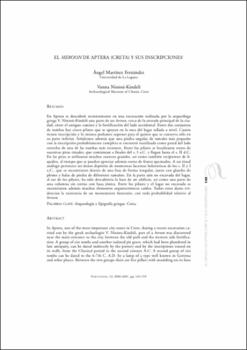El 'heroon' de Aptera (Creta) y sus inscripciones
Date
2001Abstract
En Aptera se descubrió recientemente en una excavación realizada por la arqueóloga griega V. Ninioú-Kindelí una parte de un heroon, cerca de la entrada principal de la ciudad, entre el antiguo camino y la fortificación del lado occidental. Entre dos conjuntos es que se apoyan en la roca del lugar tallada a nivel. Cuatro
tienen inscripción y lo mismo podemos suponer para el quinto que se conserva sólo en su parte inferior. Señalemos además que una piedra angular de tamaño más pequeño con la inscripción probablemente completa se encontró reutilizada como pared del lado estrecho de una de las tumbas más recientes. Entre los pilares se localizaron restos de sucesivas piras rituales, que comienzan a finales del s. I a.C. y llegan hasta el s. II d.C. En las piras se utilizaron muchos cuencos grandes, así como también recipientes de líquidos, al tiempo que se pueden apreciar además restos de frutos quemados. A un ritual análogo pertenece un denso depósito de numerosas lucernas helenísticas de los s. II y I a.C., que se encontraron dentro de una fosa de forma irregular, junto con glandes de
plomo y balas de piedra de diferentes tamaños. En la parte aún no excavada del lugar, al sur de los pilares, ha sido descubierta la base de un edificio, así como una parte de una columna sin estrías con basa jónica. Entre los pilares y el lugar no excavado se encontraron además muchos elementos arquitectónicos caídos. Todos estos datos evidencian la existencia de un monumento funerario, con toda probabilidad relativo al heroon In Aptera, one of the most important city-states in Crete, during a recent excavation carried out by the greek archaelogist V. Niniou-Kindeli, part of a heroon was discovered
near the main entrance to the city, between the old path and the western side fortification. A group of cist tombs and another isolated pit grave, which had been plundered in
late antiquity, can be dated indirectly by the pottery and by the inscriptions reused on
its walls, from the Classical period to the second century A.C. A second group of cist
tombs can be dated to the 6-7th C. A.D. by a lamp of a type well known in Gortyna
and other places. Between the two groups there are five pillars with moulding on its base and on its crown. Four of them bear inscriptions and the same could be said about the
fifth of which only the lower part remains. It must also be said that a smaller corner
stone with a complete inscription was found reused as a wall in one of the most recent
tombs. Amongst the pillars, the remains of several ritual pyres dating from the end of
the 1st century B.C. to the 2nd A.D. were found. In the pyres many large bowls were
used, as well as vessels of liquid, at the same time remains of burnt fruit can be found.
To a similar ritual belongs a dense deposit of numerous Hellenistic lamps from the first
and second centuries B.C., which were found inside an irregular shaped grave along with
some lead projectiles and different sized stone bullets. In the unexcavated area to the
South of the pillars, the base of a building has been discovered, as well as part of an
unfluted column with Ionic base. Between the pillars and the unexcavated site many fallen
architectonic elements were also found. All these findings prove the existence of a funeral monument, probably related to the heroon.






